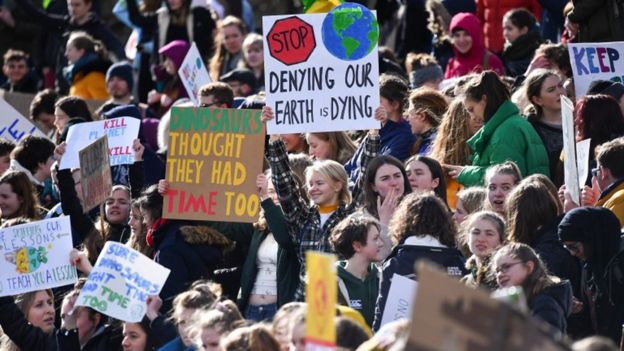The Republic of Ireland has declared a climate and biodiversity emergency.
A Fianna Fáil amendment to the Oireachtas report on Climate Action was accepted without a vote.
In May a national climate emergency was declared by the UK Parliament.
In Scotland targets are being set to reduce greenhouse gas emissions to net-zero by 2045. Dozens of local areas around the UK have also said there is a climate emergency.
There is no single definition, but many areas say they want to be carbon-neutral by 2030.
‘Action to back it up’
Fine Gael’s Hildegarde Naughton, who is chair of the Climate Action Committee, welcomed the outcome as “an important statement” but added “now we need action.”
She said the Minister for Climate Action Richard Bruton would bring new proposals to the Dáil (Irish parliament) and she looked forward to working “with all parties and none” to scrutinise them.
Green Party leader Eamon Ryan warned that “declaring an emergency means absolutely nothing unless there is action to back it up.
“That means the Government having to do things they don’t want to do,” he added.
The Fianna Fáil amendment was moved by the party’s climate action spokesman Timmy Dooley.
However, when the vote came before the House, it was put forward by Deputy Ryan as there were only six TDs in the chamber and none of them were from Fianna Fáil.
The Green Party leader said: “We have declared a climate emergency in our own Irish way.”
Teenage activist Greta Thunberg tweeted that it was “great news” from Ireland.
The issue of a biodiversity emergency is to be considered by a citizens’ assembly.
The Oireachtas Climate Action report come from a citizens’ assembly report.
What is a climate emergency?

Dozens of towns and cities across the UK have already declared “a climate emergency”.
There is no single definition of what that means but many local areas say they want to be carbon-neutral by 2030.
Some councils have promised to introduce electric car hubs or build sustainable homes to try to achieve that goal.
It’s a much more ambitious target than the UK government’s, which is to reduce carbon emissions by 80% (compared to 1990 levels) by 2050.

